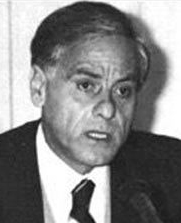

born 1937
Etienne Saqr was born in 1937 in the southern
Lebanese village of Ain Ebel, one of eleven children reared by Caesar
Saqr, a school principal. He was weaned on the memory of an infamous massacre
of Christian villagers by local Shi'ite Muslims in May 1920, which claimed
the life of his grandmother. Saqr acquired a French education typical
of Maronite families in Lebanon, passing the years of his youth at schools
in Tripoli and Beirut. After the death of his father in 1944 left his
family without financial resources, Saqr was forced to forgo a university
education. Instead, at the age of seventeen, he went to work for the Sureté
Générale (General Security Directorate). This apprenticeship
in national security, which saw him officiating at various posts along
the Syrian border, influenced his thinking about the fragility of Lebanese
sovereignty. During the early 1960s, he took part in the crackdown against
the Syrian Social National Party (SSNP), a group favoring unity with Syria,
which had carried out a failed coup attempt in 1961.
In 1962, Saqr moved from the geographical and political periphery of the
country to the capital city and assumed a position in the presidential
palace. The next eight years allowed him to study the presidencies of
Fouad Shihab and Charles Helou and reflect upon the problems of weak leadership.
During this period, Etienne married his wife, Alexandra, from Zahle and
together they bore two daughters, Pascal and Carole, and a son, Arz.
In 1969, exasperated by the government's inability to confront this growing
threat to Lebanese security, Saqr left the Sureté Générale
and went into private business, giving him the freedom to become politically
active. He soon established a rapport with intellectual personalities
who shared his anxiety about the impending calamity, such as the poet
Said Aql (who he would later call his mentor).
In 1974, he went to Baalbek to buy weapons and recruited a small group
of nationalist-minded Lebanese to prepare for the Palestinian threat.
The following year, the group was formally established as the Guardians
of the Cedars ( Hiras Al-Arz ).
On the issue of the Palestinians, Saqr advocated unyielding confrontation
and made clear the Guardians ultimate wartime objective - that "no
Palestinian shall be left on the soil of Lebanon." Asked how he would
achieve this in a July 1982 interview, Saqr replied, "Very simple.
We shall drive them to the borders of brotherly Syria." The Jerusalem
Post , 23 July 1982.
Throughout the war, Saqr's forces closely coordinated with the key Christian
militias - Pierre Gemayel's Phalange militia, commanded by his son, Bashir;
Camille Chamoun's Tigers militia, commanded by his son, Dany; and the
Marada Brigades of then-President Suleiman Frangieh, commanded by his
son, Tony.
Realizing that his Christian allies lacked the strength of will to fight
the Syrian presence (or even to stop fighting each other), in 1982 Saqr
openly welcomed invading Israeli forces. Since the mid-1970s, Saqr had
developed a public and amicable relationship with Israel that was unique
in the politics of Beirut. Whereas Chamoun and Gemayel had sought and
received Israeli military aid due to short-term strategic considerations
and avoided public discussion of their ties to Israel, Saqr believed there
to be a common destiny binding the Jewish and Lebanese peoples in the
Arab-dominated Middle East and never wavered from expressing this view
openly.
Abu Arz continued to maintain neutrality with regard to the internecine
quarrelling which continued to plague the Christian community in the 1980s,
particularly the rivalry within the LF between Samir Geagea and Elie Hobeika
. While Saqr opposed Hobeika's attempt to lead the LF toward accommodation
with Syria (which culminated in the Tripartite Agreement of September
1985), he was greatly disturbed by the fighting which broke out between
pro-Geagea and pro-Hobeika forces in late December and persuaded Army
Commander Michel Aoun to intervene and prevent the slaughter of Hobeika's
men. In part because of his efforts to stop the bloodshed, Saqr was invited
by Camille Chamoun to join the newly reestablished Lebanese Front, the
political body parallel to the LF.
While he had been instrumental in the founding of the LF in 1976, he disagreed
with the narrow Christian ethos that came to prevail within it and sympathized
with Aoun, who enjoyed broad support from all sectarian communities. Seeking
to bring an end to the bloodshed, he mediated between the two sides when
Geagea's fighters were defeated by army units in Monteverde and Beit Mery
in the Metn region. At the time, Abu Arz was present daily at the presidential
palace at Baabda with Aoun.
Abu Arz firmly supported Aoun's declaration of a war of liberation to
oust the Syrians in March 1989, though he questioned the lack of political
strategy to assure success. Syria by that time had received firm American
support for its occupation of Lebanon, which was further legitimized by
the October 1989 Taif Accord. Abu Arz implored Aoun to seek Israel's assistance,
but the general refused and persisted in condemning the Israelis nearly
as loudly as he condemned the Syrians. Nevertheless, Abu Arz formed the
Broad Front for Liberation and Change as a political cover for Aoun's
military struggle. After the LF accepted the Taif Accord in 1990, he and
his family were placed under house arrest by LF forces. He was later forced
to leave Beirut and went to live in southern Lebanon.
Rather than joining Amine Gemayel and other notable Maronite exiles in
Paris, Saqr decided to relocate to the southern border region under the
control of Israel and the SLA. Over the years, Etienne secretly visited
his family and party members twice in Beirut, avoiding the eyes of the
ubiquitous Syrian mukhabarat (intelligence services).
Although Abu Arz conducted political activities from Sabbah, near Jezzine,
during the next decade, he was not allowed to play a military role. In
February 1998, he wrote a four-page proposal calling for the transformation
of the security zone into a launch pad for the liberation of all Lebanon,
but Israeli military commanders and their SLA counterparts would entertain
no thoughts of offensive action. As Israeli public support for a unilateral
withdrawal from Lebanon increased rapidly toward the end of the 1990s,
Saqr vigorously lobbied the Israeli government to allow the transformation
of the SLA into an autonomous force capable of fending off Hezbollah attacks
after the departure of Israeli forces, but to no avail. Taking his appeal
to the United States, Saqr addressed a Lebanese-American conference in
Washington in June 1998 and testified at a congressional committee hearing
in February 2000.
In May 2000, Israeli Prime Minister Ehud Barak ordered a precipitous IDF
military withdrawal from south Lebanon, without warning SLA commanders,
leading to the collapse of the militia and the flight of around 7,000
Lebanese, including Saqr himself, into Israel. Addressing a group of Israeli
parliamentarians in the Knesset a few days later, Etienne rebuked his
host country, charging that Israel had "made heroes out of Hezbollah."
Since the Syrians completed their conquest of Lebanon in 1990, the authorities
in Beirut have constantly cracked down on the Guardians of the Cedars.
Saqr himself has been sentenced in absentia to death by a Lebanese court
on charges of "collaborating with the Zionist enemy." Those
members of the Guardians in Lebanon who have openly identified themselves
as such have been indicted on similar charges. Indeed, the authorities
have assaulted and jailed many Lebanese purely on the basis of having
met with Saqr. In 1996, a journalist for the daily Al-Nahar , Pierre Atallah,
was brutally beaten by plainclothes security agents after meeting with
him and forced to flee abroad. In August 2001, Lebanese security forces
arrested Habib Younis, the former Beirut bureau chief of the London-based
daily Al-Hayat, and Claude Hajjar, a prominent human rights activist,
on charges of plotting with Saqr to organize opposition to the Syrians.
Despite the enormous personal sacrifice he has been forced to make, Saqr
remains defiantly opposed to the Syrian presence in Lebanon and continues
to insist that he will "bend only to God."